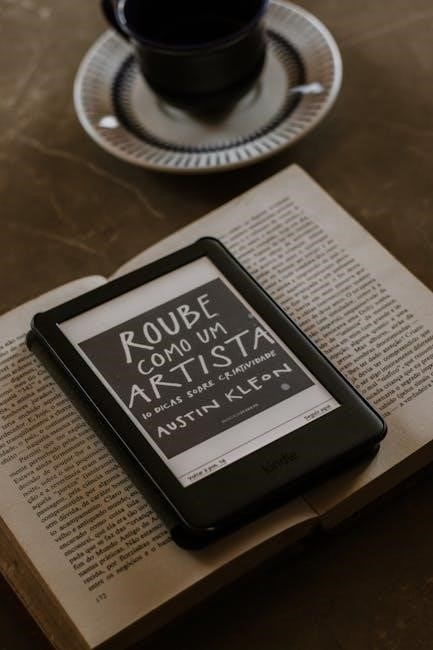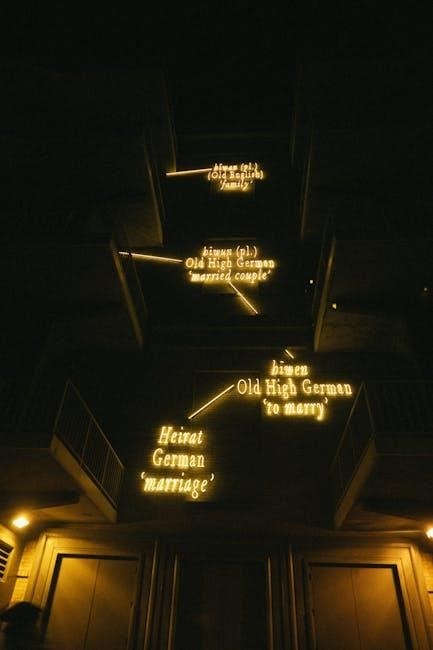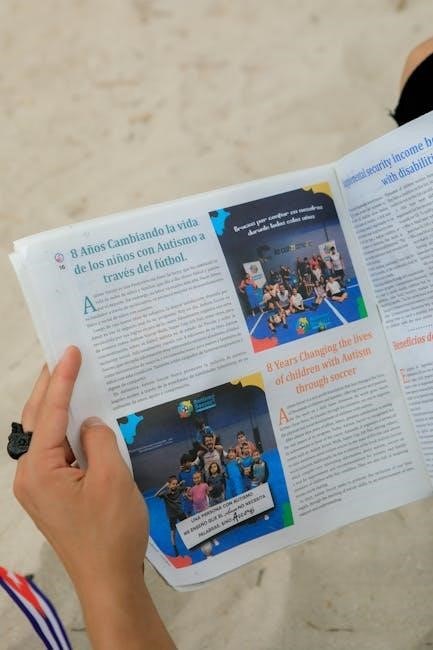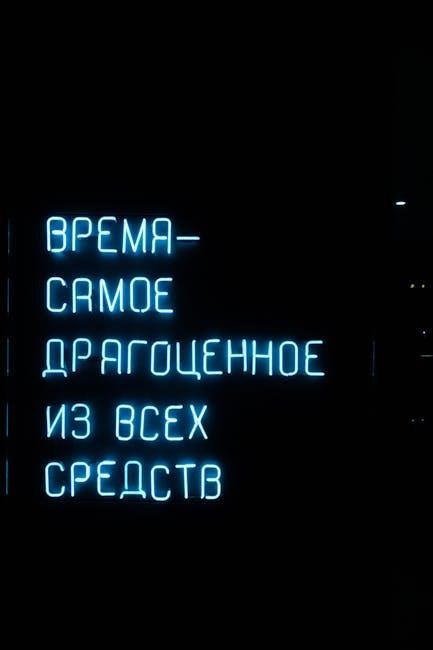Brian Friel, a renowned Irish playwright, crafted Translations in 1980, exploring themes of language, identity, and cultural shift in 19th-century Ireland. The play, set in a hedge school, reflects Friel’s deep connection to Irish heritage and his nuanced understanding of colonial impact. Its acclaim lies in its poignant portrayal of linguistic and cultural transformation, making it a cornerstone of modern Irish drama.
Background of Brian Friel
Brian Friel, born in 1929 in Omagh, County Tyrone, was a prominent Irish playwright and short story writer. He moved to Derry at age 10, influencing his deep connection to Irish culture and identity. Friel’s work often explored themes of language, history, and cultural transformation. Before gaining acclaim as a playwright, he wrote short stories and later transitioned to drama, creating notable works like Philadelphia, Here I Come! and Dancing at Lughnasa. His plays are celebrated for their nuanced portrayal of Irish life and identity.
Overview of the Play “Translations”
Translations is a play set in the fictional town of Baile Beag in 19th-century Donegal, Ireland. It revolves around a hedge school where local villagers gather to learn. The story explores the arrival of British surveyors tasked with mapping and renaming Irish places, highlighting linguistic and cultural tensions. The play delves into themes of identity, language, and colonialism, using the act of translation as a metaphor for cultural loss and transformation. It captures a pivotal moment in Irish history, blending personal narratives with broader societal change, making it a powerful exploration of cultural identity and resilience.

Plot Summary of “Translations”
The play is set in August 1833 in Baile Beag, Donegal, where a hedge school operates in a barn. British surveyors arrive to rename local places, sparking tension. Manus, a lame teacher, and his students, including Sarah, navigate this shift. The story intertwines personal struggles with the broader conflict of cultural identity, as Irish traditions clash with English dominance, revealing the poignant consequences of linguistic and cultural displacement.
Setting: Time and Place
The play is set in August 1833 in the fictional Irish village of Baile Beag (Small Town) in County Donegal. The story unfolds in a hedge school located in a disused barn, symbolizing a fading tradition of informal Irish education. The barn serves as a space where local traditions and language are preserved, while the arrival of British surveyors signals impending change. The Ordnance Survey’s renaming of local places reflects broader colonial efforts, creating tension between Irish identity and English dominance. The rural setting underscores the clash of cultures during this pivotal moment in Irish history.
Main Characters and Their Roles
Manus, a lame schoolteacher, struggles with personal and cultural challenges. Sarah, a speech-impaired student, embodies the marginalized voice. Jimmy Jack Cassie, an aging bachelor, clings to classical literature, symbolizing tradition. Yolland, the English surveyor, represents colonial influence, while Owen, Manus’s brother, acts as a conflicted translator between worlds. These characters navigate the tensions of language, identity, and cultural shift, each contributing to the play’s exploration of Ireland’s complex colonial legacy and the enduring power of human connection amidst change.
Central Conflict and Themes
The central conflict in Translations revolves around the clash between Irish tradition and British colonial influence, particularly through the Ordnance Survey’s renaming of local places. Themes of language as identity, cultural erosion, and the complexities of translation emerge. The play highlights how the suppression of native tongues and names reflects broader colonial control. It also explores memory and history, showing how these elements shape collective identity. The tension between preservation and assimilation underscores the human cost of cultural shifts, resonating deeply with Ireland’s historical struggles.

Themes and Motifs in “Translations”
Translations explores themes of language, identity, and cultural conflict, highlighting the tension between Irish tradition and British colonial influence. The play delves into the erosion of native culture through linguistic suppression, emphasizing the interconnectedness of language and identity. Motifs of memory, history, and naming underscore the struggle to preserve cultural heritage amidst colonialism, reflecting Friel’s nuanced exploration of Ireland’s complex past and its enduring impact on national identity.
Language and Identity
In Translations, language serves as a powerful symbol of cultural identity. The play highlights the tension between Irish and English, reflecting the colonial imposition of English and the decline of Irish. Friel explores how language shapes self-perception, as characters struggle with their names and cultural heritage. The renaming process by British surveyors underscores the erasure of Irish identity, while the hedge school represents a fading tradition. The interplay between linguistic loss and cultural dislocation emphasizes the profound impact of language on personal and collective identity in a colonized society.
Cultural Imperialism and Colonization
Cultural imperialism is central to Translations, as Friel portrays the British colonization of Ireland through the Ordnance Survey. The renaming of Gaelic place names symbolizes the erasure of Irish culture and the imposition of English dominance. This process reflects broader colonial strategies to assert control over conquered territories. The play critiques how such acts disrupt local identities and traditions, illustrating the profound impact of imperialism on indigenous cultures and their struggle for preservation amidst overwhelming external forces. Friel’s narrative vividly captures the tension between cultural preservation and colonial assimilation.
Memory and History
In Translations, memory and history intertwine as Friel explores how colonialism reshapes collective identity. The play highlights the tension between the Irish language, rooted in tradition, and the imposition of English, symbolizing cultural displacement. Memory is portrayed as fragile, with characters clinging to stories and names that define their past. Friel suggests that history is not just facts but the images and narratives passed down through language. The decline of Irish and the renaming of places reflect how memory is erased, leaving a void in cultural identity. This underscores the play’s themes of loss and resilience.

Language and Translation in the Play
Language and translation in Translations serve as tools of cultural negotiation, reflecting the tension between Irish identity and colonial influence. Friel uses translation to explore power dynamics, as English imposes a new order, marginalizing Gaelic traditions. The hedge school becomes a space where language shifts mirror broader societal changes, emphasizing the fragility of cultural heritage in the face of imperialism. Through this lens, Friel examines how language shapes identity and history.
The Role of the Hedge School
The hedge school in Translations symbolizes the last stronghold of Irish language and culture, operating in a disused barn or byre. It serves as a space where traditional learning, including Irish, Latin, and Greek, is preserved. The schoolteacher, Manus, embodies the resilience of Irish education despite colonial pressures. The hedge school’s informal setting contrasts with the formal, English-dominated education imposed by the British, highlighting the tension between cultural preservation and assimilation. It becomes a microcosm of Ireland’s struggle to maintain its linguistic and cultural identity in the face of colonial influence.
Irish vs. English: Linguistic Tensions
The play highlights the clash between Irish and English languages, symbolizing broader cultural and political conflicts. The Ordnance Survey’s renaming of Irish places into English reflects colonial dominance, stripping Ireland of its linguistic heritage. Irish, spoken by the locals, is gradually replaced by English, seen as the language of progress. This tension is evident in characters like Owen, who translates Irish names, bridging but also erasing cultural identities. The linguistic struggle mirrors Ireland’s fight to preserve its identity amidst colonial imposition, emphasizing the profound impact of language on national consciousness and belonging.
The Act of Translation as a Narrative Tool
Translation in the play serves as a powerful narrative device, bridging cultural gaps while revealing deeper tensions. Owen’s role as a translator symbolizes the complexities of mediating between Irish and English worlds. Through his efforts, Friel illustrates how translation can both preserve and distort meaning, reflecting the broader challenges of cultural exchange. The act of translation becomes a metaphor for Ireland’s struggle to maintain its identity while adapting to colonial influences, highlighting the delicate balance between preservation and transformation in a changing world.

Historical Context of 19th-Century Ireland
The play is set in 19th-century Ireland, a period marked by British colonization and cultural shifts. The Ordnance Survey symbolizes colonial control, reshaping Ireland’s landscape and identity, influencing Friel’s narrative.
The Ordnance Survey and Its Impact
The Ordnance Survey, initiated by the British in 19th-century Ireland, aimed to map and rename landscapes, imposing English language dominance. This process erased Gaelic place names, symbolizing cultural erasure and colonial control. In Translations, Friel uses this historical event to explore themes of identity and power, highlighting how language shapes cultural memory. The Survey’s impact on Irish society was profound, reflecting broader colonial strategies to suppress native traditions and assimilate Ireland into British culture.
The Decline of the Irish Language
The decline of the Irish language in the 19th century was a result of British colonial policies and cultural assimilation. Friel’s Translations captures this shift, as English gradually replaces Irish in official and everyday contexts. The play portrays the loss of linguistic heritage as a profound cultural tragedy, reflecting the erosion of Irish identity. The hedge school, a symbol of Irish tradition, struggles to survive amidst this change, highlighting the emotional and societal impact of language decline on communities.
Social and Political Changes During the Period

The 19th century saw significant social and political shifts in Ireland, shaped by British colonial rule. The Ordnance Survey epitomized this change, renaming Irish places to impose English dominance. Socially, the decline of Irish language and traditions accelerated, while English education gained prominence. Politically, Ireland’s integration into the British Empire deepened, altering local governance and cultural practices. These changes, reflected in Translations, highlight the tension between Irish identity and colonial influence, underscoring the play’s themes of cultural erasure and resistance.

Characters in Depth
Manus, a lame schoolteacher, embodies resilience and intellectual passion. Sarah, a speech-impaired student, symbolizes silenced voices. Jimmy Jack Cassie loves classical literature, while Yolland, an English surveyor, bridges cultures. Owen, the translator, navigates identity and loyalty, reflecting the play’s exploration of cultural tensions.
Manus: The Lame Schoolteacher
Manus, a lame schoolteacher in his late twenties or early thirties, is the brother of Owen and a central figure in the hedge school. His physical disability underscores his quiet resilience and intellectual depth. Teaching in a rural Donegal setting, Manus is deeply committed to preserving Irish traditions and language. His relationship with Sarah, a speech-impaired student, highlights his patience and dedication. Manus’s internal conflicts, particularly regarding his brother Owen’s return, reveal his struggle to balance tradition with change, embodying the tension between cultural preservation and modernity.
Sarah: The Speech-Impaired Student
Sarah, a young woman with a severe speech defect, is a student at the hedge school. Her inability to articulate words starkly contrasts with the play’s themes of language and communication. Despite her impairment, Sarah’s presence is poignant, symbolizing the struggles of those marginalized by societal norms. Her interactions with Manus and others highlight her inner strength and the barriers she faces in expressing herself. Sarah’s character serves as a powerful metaphor for the silencing of voices in a rapidly changing cultural landscape.
Jimmy Jack Cassie: The Lover of Classical Literature
Jimmy Jack Cassie, an aging bachelor, embodies a deep passion for classical literature, particularly Homer’s works. His love for ancient texts reflects a longing for a bygone era and a connection to timeless narratives. Cassie’s character symbolizes the tension between tradition and modernity, as he clings to the beauty of classical stories amidst the upheaval of cultural change. His recitations of Homer in Irish underscore the play’s exploration of language and identity, making him a nostalgic yet vital figure in the hedge school setting.
Yolland: The English Surveyor
Yolland, the English surveyor, arrives in Baile Beag to anglicize Irish place names for the Ordnance Survey. His naivety and enthusiasm contrast with the local skepticism. Despite his good intentions, Yolland represents the cultural imperialism threatening Irish traditions. His romantic interest in Sarah and admiration for Irish culture highlight his internal conflict. Tragically, Yolland’s disappearance symbolizes the lost possibilities of cross-cultural understanding, underscoring the play’s themes of identity and colonialism. His character serves as a bridge between two worlds, ultimately illustrating the irreparable divide between them.
Owen: The Ambiguous Translator
Owen, the son of Manus, serves as a translator for the English surveyors, embodying the tension between Irish tradition and colonial influence. His role as a mediator highlights his internal conflict, as he navigates loyalty to his family and the demands of his job. Owen’s character symbolizes the ambiguity of cultural identity, caught between preserving Irish heritage and adapting to English dominance. His interactions with Yolland and the locals reveal his struggle to reconcile these opposing worlds, making him a pivotal figure in the play’s exploration of language, identity, and colonialism.

Symbolism and Imagery
Friel uses the hedge school, barn, and naming rituals as potent symbols, reflecting Ireland’s cultural shift and identity loss under British rule, blending tradition with transition.
The Hedge School as a Symbol of Tradition
The hedge school in Translations symbolizes Ireland’s fading cultural heritage, offering a space for preserving Irish language and classical learning. Held in a barn, it embodies resistance to modernization and colonial influence. The school’s informal setting contrasts with the formal British education system, highlighting the tension between tradition and imposed change. Through characters like Manus and Jimmy Jack, the hedge school represents a communal effort to maintain Irish identity amidst encroaching anglicization, serving as a poignant metaphor for the erosion of cultural traditions.
The Barn as a Space of Transition
The barn in Translations serves as a liminal space, bridging tradition and modernity. Once a functional agricultural building, it now houses the hedge school, symbolizing the decline of rural life. Its disused state reflects the fading relevance of traditional Irish education. The barn becomes a site of cultural negotiation, where characters like Owen and Yolland grapple with the Ordnance Survey’s impact. It witnesses the tension between Irish identity and English influence, embodying the transitional nature of 19th-century Ireland. The barn’s decay mirrors the erosion of Gaelic traditions, marking a poignant shift in cultural and linguistic landscapes.
The Importance of Names and Naming
In Translations, names hold deep cultural and personal significance. The renaming of Irish places by British surveyors underscores the erasure of indigenous identity. Characters’ names, like Sarah and Yolland, symbolize their connection to heritage. The act of naming reflects power dynamics, as English names replace Gaelic ones, severing ties to history. Friel uses naming to explore identity, loss, and cultural displacement, highlighting how language shapes self-perception. This theme resonates through the play, emphasizing the fragility of cultural heritage in the face of colonial influence.

Reception and Criticism
Translations received widespread critical acclaim for its nuanced exploration of language, identity, and colonialism. Critics praised its depth, while some debated its portrayal of cultural tensions, ensuring its relevance in modern discussions of imperialism and heritage.
Critical Acclaim and Controversies
Translations has been hailed as a masterpiece of contemporary Irish drama, praised for its profound exploration of language, identity, and cultural displacement. Critics have lauded its nuanced portrayal of colonialism and its emotional depth. However, some scholars have debated its historical accuracy and the balance between its linguistic focus and dramatic action. Despite these debates, the play remains a landmark work, celebrated for its universal themes and its ability to evoke the complexities of cultural transition. Its enduring relevance continues to spark academic and theatrical discourse.
Comparisons with Other Works by Friel
Translations is often compared to Friel’s other works, such as Philadelphia, Here I Come! and Faith Healer, for its exploration of identity and cultural tension. Like these plays, Translations delves into the complexities of Irish heritage and the impact of external influences. However, its unique focus on language as a tool of colonialism sets it apart. While Philadelphia examines personal identity, Translations expands this to a communal level, making it a quintessential Friel piece that bridges personal and political narratives seamlessly.
Modern Interpretations and Relevance
Translations remains a vital work in contemporary discussions on identity, language, and cultural displacement. Modern scholars often analyze it through postcolonial and globalization lenses, highlighting its timeless relevance. The play’s exploration of how language shapes identity resonates deeply in today’s multicultural world. Its themes of cultural erasure and resistance continue to inspire new interpretations, making it a cornerstone of academic and theatrical exploration. Friel’s masterpiece bridges past and present, offering insights into the enduring impact of colonialism and the power of language in defining selfhood.

Availability of “Translations” in PDF Format
Translations is widely available in PDF format through academic archives, libraries, and online platforms. Free access options exist via the Boston Public Library and Internet Archive, while paid versions are offered by academic sources and publishers.
Online Resources and Archives
PDF versions of Brian Friel’s Translations are accessible through various online platforms. The Boston Public Library offers a digitized copy via the Internet Archive, available for free download. Additionally, Google Scholar and academic databases like JSTOR provide access to the play, often requiring institutional access. Some universities and online repositories also host PDFs of the play, making it easily accessible for research and study purposes.
Academic and Library Sources
Brian Friel’s Translations is widely available in academic and library sources, including digitized versions through the Internet Archive, funded by the Kahle/Austin Foundation. Many universities and research institutions provide access to the play via platforms like JSTOR and ProQuest. Libraries such as the Boston Public Library offer free PDF downloads, while academic databases ensure comprehensive access for scholars. These sources are invaluable for researchers, offering high-quality, verified versions of the play for in-depth study and analysis.
Free vs. Paid Access Options
Accessing Translations in PDF format is possible through both free and paid options. Free versions are available on platforms like the Internet Archive, which offers digitized copies funded by organizations such as the Kahle/Austin Foundation. Universities and academic institutions often provide complimentary access through their libraries or online databases. Paid options include subscriptions to academic platforms like JSTOR or ProQuest, ensuring high-quality, verified versions of the play. While free sources are convenient, paid access often guarantees better formatting and reliability for scholarly use.
Translations remains a powerful exploration of cultural identity, language, and colonialism; Its relevance endures, offering timeless insights into Ireland’s past and its ongoing cultural evolution.
Final Thoughts on the Play’s Significance
Translations is a profound exploration of cultural identity, language, and colonialism. Brian Friel masterfully captures the tension between tradition and modernity, reflecting Ireland’s complex historical narrative. The play’s timeless themes resonate globally, highlighting the universal struggle to preserve cultural heritage amidst external forces. Its nuanced portrayal of linguistic shifts and personal identities underscores its enduring relevance, making it a cornerstone of modern Irish literature and a vital work for understanding colonial impacts on indigenous cultures.
Encouragement to Read and Explore Further
Embark on a journey through Brian Friel’s Translations to uncover the rich tapestry of Irish culture and history. This play offers a deeply moving exploration of identity, language, and colonialism, providing insights into the human experience. Accessing the PDF version allows for a seamless reading experience, enabling readers to delve into its themes and characters. Further exploration of Friel’s works and historical context enhances understanding, making Translations a compelling read for scholars and literature enthusiasts alike.
